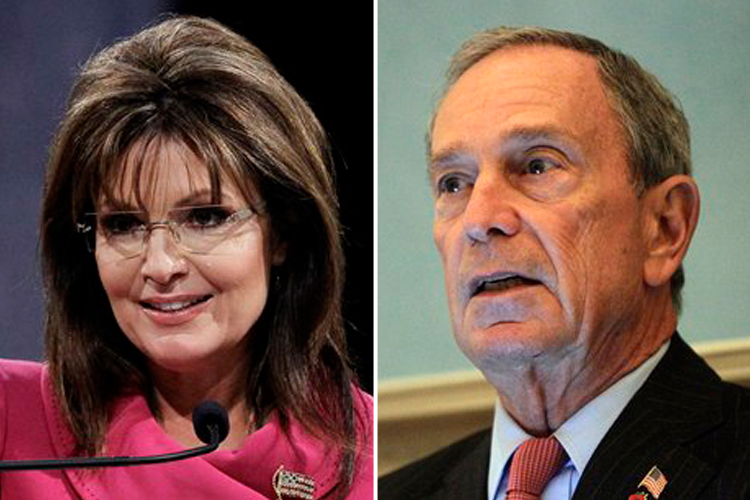In New York magazine, John Heilemann presents an elaborate scenario under which Sarah Palin secures the Republican presidential nomination in 2012 and then claims the White House, thanks to a third-party candidacy from Michael Bloomberg:
By the accounts of strategists in both parties, Bloomberg—especially with the help of his billions—would stand a reasonable chance of carrying New York, New Jersey, Connecticut, Florida, and California. Combine that with a strong-enough showing in a few other places in the industrial Northeast to deny Obama those states, and with Palin holding the fire-engine-red states of the South, and the president might find himself short of the 270 electoral votes necessary to win.
As far-fetched as it seems, Heilemann makes a decent case. Palin, after all, has been acting more and more like a candidate this year, casting doubt on the initial conventional wisdom that had her passing on a White House bid because a loss would destroy her marketability. As Heilemann notes, she seems to have the bug — and rational concerns about protecting her brand may not matter much to her. And when you see candidates like Sharron Angle, Christine O’Donnell and Joe Miller winning Republican primaries, and when you consider how wide-open the GOP field for ’12 seems — well, is it really that hard to imagine candidate Palin winning Iowa and South Carolina, then sweeping through the South, winning a bunch of caucuses and seizing the nomination?
And if Palin can win the nomination, the odds of a third-party candidacy will increase, with a Bloomberg bid a real possibility. He was interested in running in 2008, but concluded that the opening just didn’t exist. But if the GOP were to pick Palin and the economy were still in rotten shape, there could be more room in ’12.
Still, a few points need to be made:
- As fond as the conservative base is of Palin, it’s still an open question whether it will actually vote to nominate her. Right now, Mitt Romney is the nominal front-runner, and it’s not that hard to imagine Palin beating him in a one-on-one contest; in a way, a Palin-Romney fight would mirror what we’ve seen across the country this year, with establishment-friendly Republicans failing to convince the party’s conservative base that they’re true believers. But circumstances could change between now and ’12, and even if they don’t, getting that one-on-one race could be difficult for Palin. Remember that she would be far from the only “real conservative” in the race. There’s a clear opening for a dark horse to emerge — think John Thune, Mitch Daniels or Chris Christie; someone more plausibly electable than Palin and someone around whom opinion influencers on the right might rally. If the Sean Hannitys of the world spend 2011 and early 2012 saying, “Hey, I love Sarah Palin, but if we want to win the White House, we need Chris Christie,” that could kill her nomination hopes.
- A Palin nomination would make it much more likely that we’d see a third-party bid in ’12, but it doesn’t mean that candidate would be a major factor on Election Day. Here, the example of 1980 looms. The conservative base was as restive then as it is today; the election cycles of 1978 and 1980 were the last to feature the number of serious primary challenges to GOP senators that we’ve seen this year. In that climate, the GOP base united around Ronald Reagan, who was initially regarded as too extreme to win the presidency — the candidate that Jimmy Carter and the Democrats most wanted to face in the 1980 campaign. Reagan’s rise prompted John Anderson, a liberal Republican congressman from Illinois, to drop his bid for the GOP presidential nomination and to run as an independent instead. At first, Anderson found significant support in the polls, but his lack of money and organization caused his standing to drop steadily; voters eventually decided it was a two-man race and Anderson ended up with just 5.7 percent of the vote. If Palin were to emerge on the GOP side in ’12, there’d be a similar opportunity for a candidate with appeal to anti-Palin Republicans (and Republican-friendly independents), but without serious money and organization, that candidate would go nowhere.
- Which brings us to Bloomberg, who would have serious money and could theoretically match or exceed the 19 percent that billionaire Ross Perot nabbed in 1992. Perot, had he been a more stable character, could potentially have done far better himself; he led three-way polling into the early summer of 1992, but melted down as the media scrutinized him. His support had slid to just under 30 percent when he dropped out in mid-July, only to reemerge at the end of September. Whether Bloomberg would be more durable is uncertain. It’s also unclear whether Bloomberg, with his Upper East Side cultural liberalism, would be able to tap into the same Middle American populist spirit that Perot, with his Texas folksiness, did. Plus, it would take a very particular set of circumstances for Bloomberg to reach Perot ’92 levels in the polls; as Heilemann notes, if the economy is coming back in ’12, there just won’t be an opening for Bloomberg — even if the GOP picks Palin. Perot’s ghastly follow-up campaign in 1996, when a broadly satisfied electorate reelected Bill Clinton in a snoozer, shows what happens when an independent tries to run in such a climate.
I’ll admit that I’m starting to believe Palin will run for president in 2012. But I’m not at the point where I think she’ll win the Republican nomination — yet.

